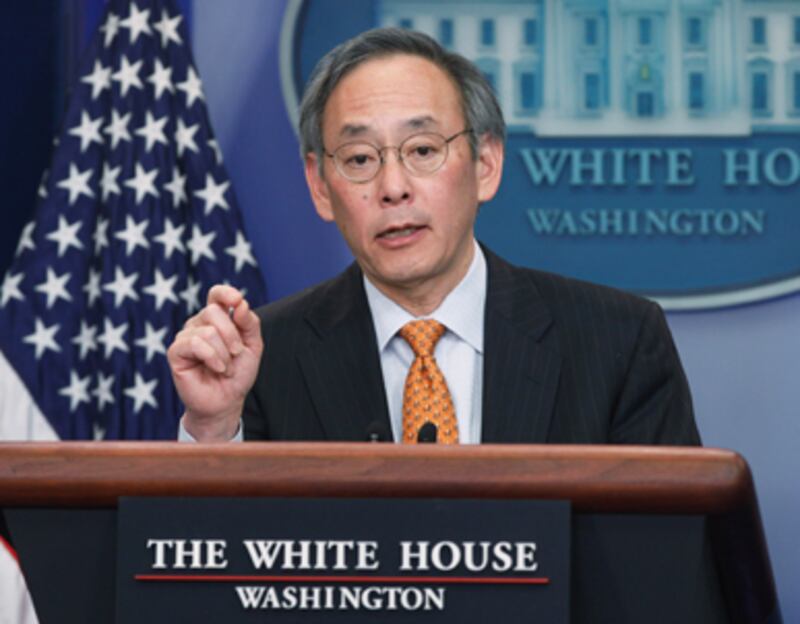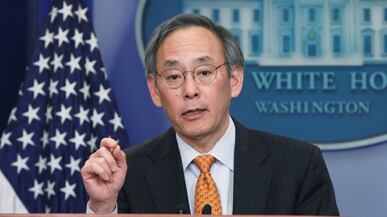Scan today’s headlines—from Japan’s leaking nuclear reactors to wars in the Middle East to the rising price of gas at the pump—and you’ll see that energy underlies the most pressing challenges we face today.

That’s why the most important man in Washington you don’t know is Energy Secretary Steven Chu.
Chu is the first Nobel Prize winner to ever be appointed to a presidential Cabinet (and, as President Obama joked last week, “he actually deserved his.”) Chu, the former director of the renowned Lawrence Berkeley National Laboratory, is also the first Chinese-American to be named a Cabinet secretary.
He has earned a reputation as a tireless worker, with encyclopedic knowledge of his field and fidelity to a vision for a future in which America is the leading exporter of clean energy technology—helping the economy, the environment, and national security all at once. What keeps him up at night? “I don't want to see 10 or 20 years from today the United States importing all the technologies that we could have been the leader in.”
Late last week, the day after President Obama unveiled a new energy goal for the United States—reducing our oil imports by one-third within a decade—I spoke to Secretary Chu by telephone. A shorter version of the interview appears in Newsweek.
"I don't want to see 10 or 20 years from today the United States importing all the technologies that we could have been the leader in."
Q: Why should Americans not be concerned about the safety of nuclear power after what they've seen in Japan?
A: Whenever there is an accident, it's very natural to have concern… We'll take this opportunity to look again at all our nuclear sites to see if there is anything that has been missed. They are designed for what we call multiple disasters. Our big trouble with [Japan] is they were not designed for quite the severity of the earthquake and tsunami that did occur… We get 20 percent of our electricity from nuclear power and you just don’t turn that off overnight. We think that nuclear power should be part of the mix going into the future.
Q: Given the president's new goal of reducing oil imports by one-third within a decade, why not drill ANWR [Arctic Natural Wildlife Refuge]?
A: ANWR you can drill as a last resort. [But] there are many other places that one can drill, both in Alaska, on land in the United States, and offshore in the Gulf. As the president pointed out, we now have leases on land and offshore where only about half of them are being exploited. So before somebody stakes more claims, why don't they develop what they have already?
Q: What are your thoughts on the fact that gas prices have doubled under the Obama administration?
A: The price of oil and the price of gasoline are governed by world market force; it is a supply and demand… As the world starts getting out of the deep recession, the demand goes up and the price goes up. [But] we don't have to be a slave to these roller coaster rides in the oil price if we have other choices for transportation energy, and that's what the president is committed to do—developing these other choices, like natural gas and electrification.
Q: You are the first Nobel Prize winner to be named a Cabinet secretary. Did you ever tease Obama about not actually earning his Nobel Prize? Because he doesn't seem to think he deserved it.
A: No, I think he deserved it. He was being very gracious and overly modest. He likes to kind of occasionally yank my chain about being a nerd, which I love.
Q: In one sentence, describe your research.
A: We used laser light to cool down atoms to very, very low temperatures.
Q: Last summer you wrote a paper called ‘Subnanometer Singlemolecule Localization Registration and Distance Measurements.’ When asked about it, you said, “I consider it my equivalent of vegging out in front of the TV.”
A: The first 80 hours a week of my time goes to my full-time job at the Department of Energy. But in the wee hours of the morning, on airplane trips, I can go back and forth. It doesn't take much time and it's a good release. It is like vegging out in front of the TV.
Q: In his energy speech, the president put you in charge of improving the safety of natural gas exploration and delivery: coordinating the industry, states, environmental experts to assure that natural gas extraction—or fracking—does not pollute our water supply. What is your plan for proceeding?
A: When you're drilling to get to shale rock and you're forcing fracking fluids into that shale rock, you want to make sure that anything you bring back up doesn't contaminate the water tables that are further up. There are methods in the oil industry of ‘double containment’ to make sure that any fluids that you're putting down there don't have a chance of leaking into a water table. So that's Point 1. That industry knows how to do it and just has to do it in the correct way.
The other issue has to do with the fracking fluids. You're using those fluids to use the pressure to hydraulically fracture the rock and then you slurp back up the fluids with the natural gas. When you do this, first the fluids themselves—and there are going to be issues, and I think eventually they're going to be disclosing what the fluids are—but you are also bringing up other things underground. It's like any deep mining operation: you're going to be bringing up possibly heavy metal contaminants. You're going to be bringing up radioactive materials. When you do that, you need to treat that water. Now, the water is being ported over to a sewage plant, but the sewage plant may not have the technology to take some of these things. So this automatically goes front and center into a lot of the technical expertise that the Department of Energy has. I think that's why the president made the decision. We have developed technologies on how to extract radioactive materials, how to extract heavy metals. These are the things we have to deal with in cleaning up the Cold War legacy for the last 50 years. So that becomes very much in our technological expertise. The development of this technological expertise—and I think it can be done quickly—to make it available to water treatment plants, is something that is a proper role of the federal government…. So the very first thing we want to do is to work with industry and the water treatment plants to develop those technologies so we can make sure that we have clean drinking water.
Q: George Bush semi-famously announced a $1.2 billion plan for hydrogen fuel cells for cars and this was something the Obama administration apparently shut down, saving taxpayers around $100 million a year. Why did you take that step?
A: Well, we didn't shut it down—we throttled it back, to be fair. Because we were looking at: ‘In the next 10 or 15 years what will actually get into the marketplace sooner?’ We think that stationary fuel cells will be finding applications, and we're continuing to fund that program, as are other companies. [But] the different automobile manufacturers have different views of fuel cells for cars. Some companies are still in it, others have abandoned it, and so we decided let's first work on the stationary fuel cells, which we know will have a market… But this progress will continue. One of the things that we were concerned about is the progress in fuel cells has actually been very good, but you need much more in a fuel cell when you have cars running on hydrogen. You need a distribution network. You need a source of hydrogen. You need better hydrogen storage as well as the fuel cells. So the fuel cells and the longevity are not cost effective yet, but they're improving.
Q: You’ve said “science has unambiguously shown that we're altering the destiny of our planet.” Do you still hold out hope for climate-change legislation?
A: Congress responds to the will of the people, and right now, what's first and foremost on people's minds is the economy. But having said that, I think that the things that we need to combat climate change—using energy more efficiently, developing cleaner sources of energy—will be boosts to our economy. The case that not only the climate is changing, but that it is caused predominantly by humans, are more compelling each succeeding year despite attempts to muddy the waters, as there were attempts to muddy the waters for decades about the dangers of cigarette smoking. In the end, the truth will win out, because you can't turn a matter of science into a political debate. It's like, ‘if you get enough votes, you can repeal Newton's second law.’ It doesn't work that way.
Q: In the State of the Union, the president called for closing tax loopholes for the oil and gas industry. When are we going to stop subsidizing, in effect, our dependence on oil?
A: This is certainly something the president feels strongly about. Oil subsidies in the United States started in 1917. One hundred years is a long enough time. The oil industry is doing quite well, and the amount of subsidy is a very, very small fraction of the total revenues, so it's not really going to have any material effect on prices. When you take any beginning industry, you do want to subsidize it until it's self-sufficient. You don't want to go in with the idea that you're going to be subsidizing any industry forever, and that also includes renewables.
John Avlon's most recent book Wingnuts: How the Lunatic Fringe is Hijacking America is available now by Beast Books both on the Web and in paperback. He is also the author of Independent Nation: How Centrists Can Change American Politics and a CNN contributor. Previously, he served as chief speechwriter for New York City Mayor Rudy Giuliani and was a columnist and associate editor for The New York Sun.
Corrects to reflect Steven Chu was director of the Lawrence Berkeley National Laboratory.






